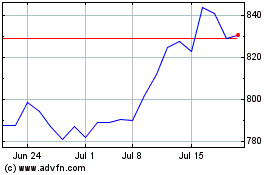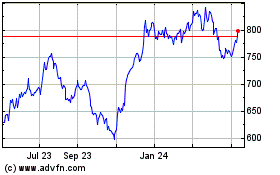2ND UPDATE: SEC Reviewing Effects Of ETFs On Volatility
October 19 2011 - 1:14PM
Dow Jones News
The Securities and Exchange Commission is taking a close look at
exchange-traded funds, including their transparency and impact on
market volatility, a top SEC official said Wednesday.
The ETF review comes on top of a separate inquiry on mutual
funds, exchange-traded funds and other investment companies that
use derivatives announced in early 2010. Regulators are
increasingly concerned about the risks to less-sophisticated
investors of "leveraged" ETFs, which amplify investor bets often
through the use of derivatives.
Eileen Rominger, director of the SEC's division of investment
management, told a Senate Banking subcommittee Wednesday that the
agency's wide-ranging review of exchange-traded products includes
examining the adequacy of investor disclosure, liquidity levels and
transparency of underlying instruments in which exchange-traded
products invest.
She also said the SEC is examining ETF's "fair valuations,
efficiency in the arbitrage process and the relationship between
market volatility" and exchange-traded products.
ETFs, which typically track market indexes, function similar to
mutual funds but trade on exchanges like stocks. ETFs have surged
in popularity and now generate 35% to 40% of exchange trading
volume, according to research company Morningstar Inc. Such funds
sometimes are used by high-frequency traders, who buy and sell
stocks and other assets at a rapid clip, making money on small
price moves.
What are known as inverse ETFs, which also can be leveraged, are
like mirror-image indexes, gaining if the underlying index falls
and falling if the index gains.
The SEC inquiry into ETFs stems out of a broader look by
regulators at the use of derivatives by mutual funds and other
investment companies. As part of that broader inquiry, the SEC
voted in August to begin a public dialogue on the issue, a first
step in assessing the need for further regulation.
For nearly two years, SEC staff have been looking at whether
investment companies that use derivatives should implement special
protections for their investors.
In March 2010, the SEC put on hold requests by exchange-traded
funds to invest in derivatives, pending the conclusion of its
review. The agency is unlikely to close the review until it
incorporates the comments it receives from its August "concept
release" that is designed to spur public dialogue. Those comments
are due by the end of October.
At Wednesday's hearing, Noel Archard, who heads product
development at BlackRock Inc.'s (BLK) iShares unit, said there is a
need for new standards for exchange-traded products to enhance
transparency and investor protection, particularly to designate
products with greater risk.
"Clear labeling combined with disclosure of fees and risks is a
critical starting point to achieving the better clarity investors
need to understand various structures," he said.
Rominger said BlackRock's labeling idea merited serious
consideration.
Critics argue that ETFs contribute to market volatility when
market makers buy and sell stocks or other underlying assets in
ETFs, to rebalance their portfolios.
Rominger acknowledged ETFs might contribute to volatility,
though she said the SEC is studying the matter and would reach a
conclusion "in due course."
Eric Noll, executive vice president of NASDAQ OMX (NDAQ), who
also testified Wednesday, said ETFs were a "tempting target" but
downplayed their role in causing market volatility. He said the
true drivers include the European sovereign debt crisis, imbalances
in the U.S. budget or its high unemployment levels.
But Harold Bradley, the chief investment officer at the Ewing
Marion Kauffman Foundation, noted ETFs have grown so fast in number
and in variety that they now account for roughly half of all the
trading in U.S. equities markets today.
"In the process, in our view, ETFs have increasingly distorted
the role of equities markets in capital formation, while posing
systemic risks from potential settlement failures," he said,
referring to occasions when brokers fail to deliver shares to
investors.
-By Andrew Ackerman, Dow Jones Newswires; 202-569-8390;
andrew.ackerman@dowjones.com
BlackRock (NYSE:BLK)
Historical Stock Chart
From Apr 2024 to May 2024

BlackRock (NYSE:BLK)
Historical Stock Chart
From May 2023 to May 2024
